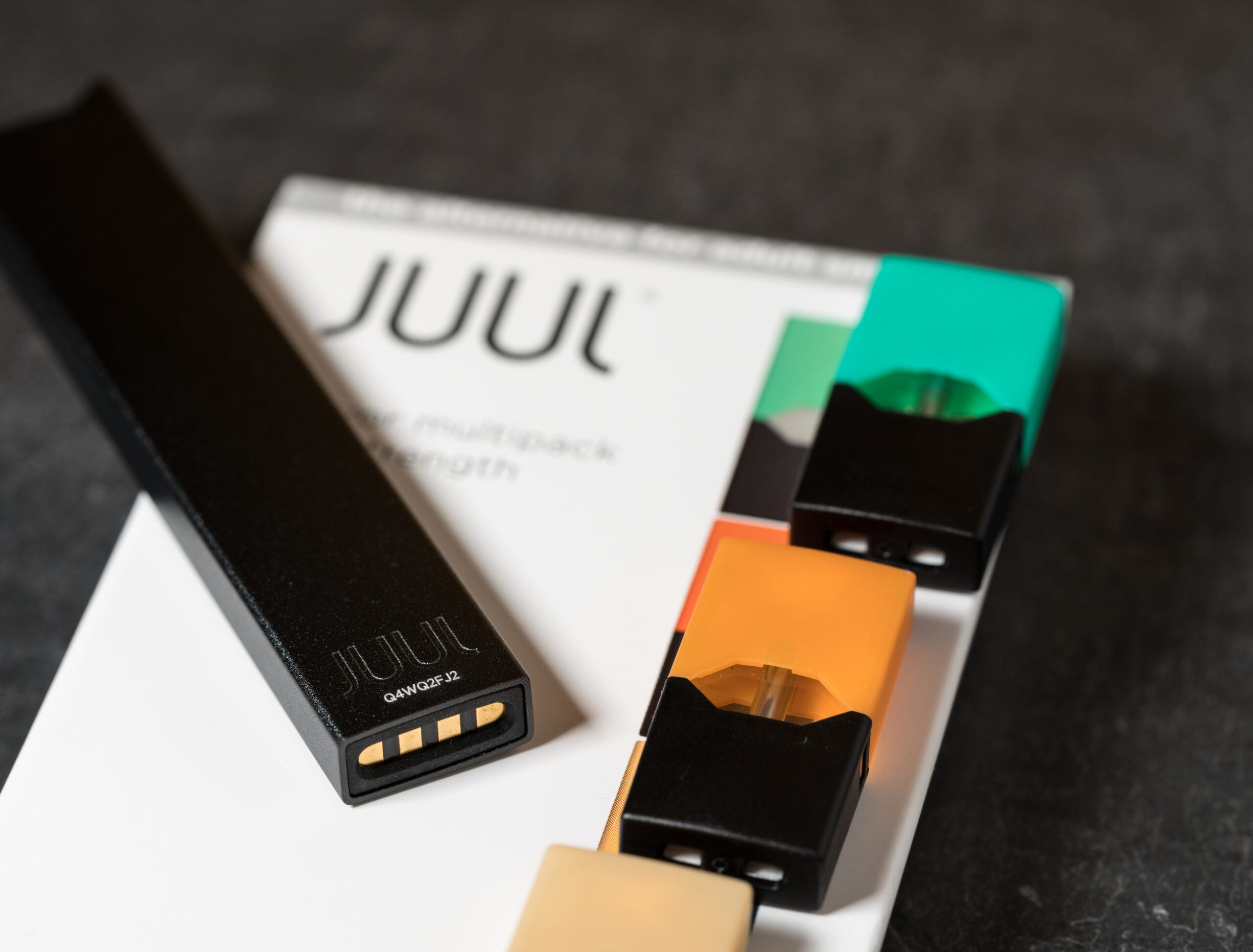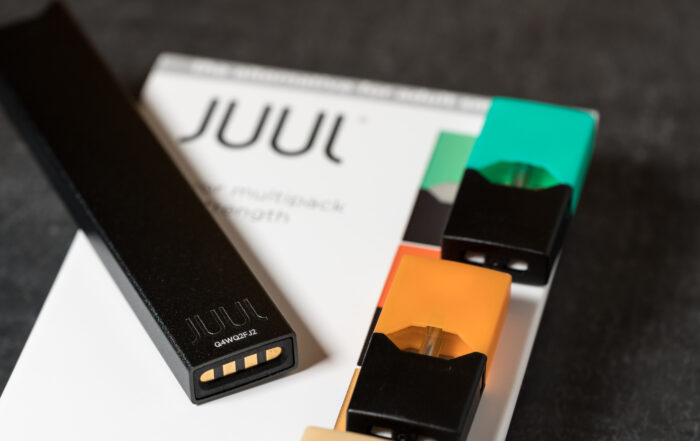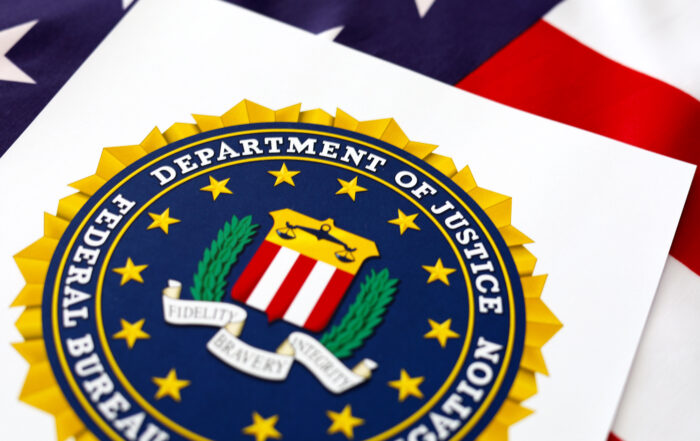
Juul Labs, Inc. v. FDA: A FOIA Twist on the Challenge to FDA’s Marketing Denial Order
By Robert S. Claiborne, Jr., Bryan M. Haynes & Agustin E. Rodriguez
Recent Freedom of Information Act (FOIA) litigation raises an interesting question: When federal agency action requires analyses under a holistic, multi-factor statutory standard, may the agency withhold from disclosure as “deliberative” records related to analyses that purportedly were not factored into the agency’s final decision? A federal court will address this question of public disclosure in litigation between Juul Labs, Inc. (JLI) and the U.S. Food and Drug Administration (FDA).
On June 23, 2022, JLI petitioned the U.S. Court of Appeals for the D.C. Circuit to review FDA’s marketing denial order (MDO) on its premarket tobacco product applications (PMTAs).[1] The PMTAs presented FDA with the question of whether JLI’s tobacco products are appropriate for the protection of the public health (APPH) under the Federal Food, Drug, and Cosmetic Act (FDCA),[2] and JLI’s petition presents the court with the question whether the MDO was arbitrary and capricious under the Administrative Procedure Act (APA).[3] On September 20, 2022, JLI filed a separate action against FDA, in the U.S. District Court for the District of Columbia,[4] alleging that FDA unlawfully failed to produce records in response to JLI’s FOIA requests for records related to the MDO.[5] FDA withheld certain records that it created in connection with its review of JLI’s PMTAs, claiming that those records were exempt from FOIA’s disclosure requirement under the deliberative process privilege.
The MDO, FOIA Requests, and Litigation
The facts and timing of events around the issuance of the MDO raise questions regarding FDA’s withholding of related records. Although “people familiar with the matter” had informed The Wall Street Journal earlier,[6] FDA issued the MDO to JLI on June 23, 2022. According to the MDO, JLI submitted insufficient information regarding toxicological risks to evaluate whether its products are APPH.
Less than an hour before the FDA Center for Tobacco Products’ (CTP) Office of Science (OS) issued the MDO, Michele Mital—CTP’s Acting Director at the time—signed a memorandum to file[7] (Memo to File) regarding the MDO and two separate OS technical project lead review reports (TPLs) created in review of JLI’s PMTAs. Generally, a TPL is foundational to FDA’s grant or denial of a marketing order. A TPL documents whether a product meets the APPH standard and includes OS’s description of the multidisciplinary review completed on the PMTA. Of the two TPLs on JLI’s PMTAs, one addressed toxicology (Toxicology TPL) and the other addressed all other relevant scientific disciplines (Second TPL). OS issued the Toxicology TPL on June 23, 2022, before OS issued the MDO and before Ms. Mital signed her Memo to File. OS apparently also issued the Second TPL that day, but the specific time is not stated in existing court filings.
Additionally, although it ordinarily stores its TPLs and disciplinary review documents in a designated, internal database, CTP “decided that the [Second TPL] should not be stored in the . . . database, but instead maintained with other working files.” According to a declaration of Ms. Mital filed in the FOIA litigation, this was done “[t]o prevent internal confusion regarding whether the [Second TPL] provided any part of the basis of the agency’s ultimate decision.” Former FDA employees have informed the authors that such segregation of files within the agency is highly irregular.
According to Ms. Mital’s Memo to File, her office reviewed the Toxicology TPL and “concur[red] that the toxicological issues are dispositive of the applications,” so it was “not necessary . . . to review and resolve (and thus CTP has not resolved) any other aspects of the applications.” She added that “the discipline reviews and related conclusions in the [Second TPL] . . . have not been adopted by [her office] and do not reflect complete agency consideration or a final agency decision,” but “the MDO letter should indicate that the list of deficiencies supporting the denial is not necessarily exhaustive.”
The Memo to File was apparently issued as part of the CTP Director office’s “practice” of “review[ing] any conclusions reached by OS for this bundle [of JLI’s PMTAs] before those conclusions became a final agency decision.” According to the Memo to File, this was a “longstanding practice, during consultations related to the Juul application bundle.”
On the same day that JLI received the MDO, it filed its petition for review with the D.C. Circuit and sent FOIA requests to FDA. JLI later requested (and FDA granted) FDA’s supervisory review of the MDO, which remains ongoing. Pending the outcome of the supervisory review, FDA has administratively stayed the MDO, and the D.C. Circuit is holding the case in abeyance. JLI’s FOIA requests sought the TPLs, the disciplinary review documents, and any other documents related to the review of its PMTAs. In response, FDA produced the Toxicology TPL and related toxicology review documents but asserted the deliberative process privilege to withhold other records, including the Second TPL and non-toxicology disciplinary review documents. The FOIA litigation ensued over these documents, and the parties have filed cross-motions for summary judgment, which are pending before U.S. District Court Judge Randolph D. Moss.
Deliberative Process and Final Action
In view of the APPH standard and several apparent anomalies in FDA’s handling of JLI’s MDO, FDA’s invocation of the deliberative process privilege raises interesting questions.
Under the FDCA, FDA may issue an MDO if “there is a lack of a showing that permitting such tobacco product to be marketed would be” APPH.[8] The APPH finding “shall be determined with respect to the risks and benefits to the population as a whole, including users and nonusers of the tobacco product, and taking into account . . . the increased or decreased likelihood that existing users of tobacco products will stop using such products; and . . . the increased or decreased likelihood that those who do not use tobacco products will start using such products.”[9] Congress intended APPH “to be a flexible standard that focuses on the overall goal of reducing the number of individuals who die or are harmed by tobacco products.”[10] It is a holistic, multi-factor standard. Moreover, the APA prohibits FDA from making an APPH finding that is “arbitrary” or “capricious,” and agency action may be set aside as such if it “entirely failed to consider an important aspect of the” matter before it.[11]
Under FOIA, a federal agency “upon any request for records . . . shall make the records promptly available to any person.”[12] This requirement does not apply to “inter-agency or intra-agency memorandums or letters that would not be available by law”—including under the deliberative process privilege—“to a party other than an agency in litigation with the agency.”[13] The deliberative process privilege covers an agency’s pre-decisional, deliberative records created in the course of selecting an action but not the records reflecting the final agency action or its rationale.[14] In other words, FOIA does not require an agency “to operate in a fishbowl,” but the deliberative process privilege does not require a requestor “to operate in a darkroom.”[15]
Members of Congress have expressed concerns that the “deliberative process privilege is the most used privilege and the source of the most concern regarding overuse,” with some commentators “calling it the ‘withhold it because you want to’ exemption.”[16] Such concerns have resulted in legislative reforms, including a limitation on the permissible withholding of exempt records to circumstances where “the agency reasonably foresees that disclosure would harm an interest protected by an exemption.”[17] Moreover, courts will not necessarily accept an agency’s characterizations in support of the privilege. “[D]etermining whether an agency’s position is final for purposes of the deliberative process privilege is a functional rather than formal inquiry.”[18] A court will not go along with an agency’s “charade” pretending that a record is pre-decisional and deliberative when the evidence shows that it is not.[19] The privilege is not a “get-out-of-FOIA-free card” for the agency.[20]
In view of these legal standards, there are at least three primary issues apparent in FDA’s withholding of the Second TPL and non-toxicology disciplinary review documents.
First, it appears odd that FDA issued two TPLs compartmentalizing different aspects of FDA’s multidisciplinary APPH analysis. The authors have never seen FDA issue bifurcated TPLs for any request for tobacco product marketing authorizations. Consistent with an example on FDA’s website,[21] as well as other publicly available TPLs referenced in JLI’s court filings, every TPL of which the authors are aware—except JLI’s—reflects the entire multidisciplinary analysis for the respective product. The irregularity of this approach is also reflected in CTP’s decision to keep the Second TPL outside of its ordinary database “[t]o prevent internal confusion[.]” The fact that the Toxicology and Second TPLs were compartmentalized based on OS’s “consultations” with the CTP Director’s office and subject to that office’s “review” leads one to wonder what else was discussed. And FDA’s assertion that the Second TPL was pre-decisional is also questionable, given that The Wall-Street Journal learned of FDA’s decision before OS issued the TPLs or MDO and before Ms. Mital issued her Memo to File.
Second, the regularity of FDA’s public disclosure of TPLs undermines claims that its disclosure of the Second TPL and non-toxicology disciplinary review documents would harm interests protected by the deliberative process exemption. Judge Christopher R. Cooper of the U.S. District Court for the District of Columbia recently issued an instructive decision in Vanda Pharmaceuticals, Inc. v. FDA.[22] Addressing FDA records relating to its multidisciplinary review of a supplemental new drug application, Judge Cooper held that FDA “failed to show any foreseeable harm that would arise if the requested reviews were released.”[23] FDA argued that disclosure would have a chilling effect on internal communications, claiming that its reviewers might be deterred from giving honest assessments if they knew that their review records could be disclosed. Judge Cooper was “not convinced.”[24] FDA publicly discloses the review records “in a variety of circumstances,”[25] and FDA did not establish that its reviewers expected their deliberations to remain private. “Disclosure cannot chill deliberations if those deliberating do not reasonably expect their deliberations to remain private.”[26] Although Judge Cooper’s Vanda decision does not bind Judge Moss in JLI, Vanda’s reasoning could be followed as the factual matters regarding supplemental new drug applications, FDA review records, and the prevalence of those records’ disclosure are materially similar to those regarding PMTAs, TPLs, and disciplinary review documents, and those documents’ usual disclosure.
Third, and more broadly, the holistic standards of the FDCA and APA are in tension with the decision to base the MDO solely on toxicology concerns reflected in the Toxicology TPL. OS’s creation of separate TPLs raises questions about how FDA evaluated all of the relevant evidence consistent with its obligations under the law. Those legal questions remain to be briefed by the parties, and it will be interesting to see how FDA’s compartmentalized, toxicology-only review measures up against its respective FDCA and APA obligations to consider overall “risks and benefits to the population as a whole”[27] and each “important aspect”[28] of the PMTAs.[29]
**********
While it remains to be seen what exactly happened with JLI’s PMTAs, it is not difficult to imagine that an agency could assert pretextual or piecemeal grounds for an action, withhold records that may undermine those asserted grounds, and attempt to more-or-less insulate its action from meaningful review. And it is not farfetched to think that an agency could be overeager to use the deliberative process privilege to shield records that may lead to scrutiny of its actions. That is reflective of the reasons why we have FOIA and the APA. Congress intended these laws, respectively, “to assure the availability of Government information necessary to an informed electorate”[30] and to “require[] adequate, fair, effective, complete, and just determination of the rights of any person in properly invoked proceedings.”[31]
[1] Juul Labs, Inc. v. Food & Drug Admin., Case No. 22-1123 (D.C. Cir.).
[2] 21 U.S.C. § 387j(c).
[3] 5 U.S.C. § 706(2)(A); 21 U.S.C. § 387l(b).
[4] Juul Labs, Inc. v. Food & Drug Admin., Case No. 1:22-cv-02853 (D.D.C.).
[5] See 5 U.S.C. § 552(a)(4)(B).
[6] Jennifer Maloney, FDA to Order Juul E-Cigarettes Off U.S. Market, Wall St. J. (June 22, 2022), https://www.wsj.com/articles/fda-to-order-juul-e-cigarettes-off-u-s-market-11655904689.
[7] Generally speaking, a memorandum to file is an internal memorandum, without designation of a specific recipient, that can be used to document contemporaneous observations or impressions for future reference.
[8] 21 U.S.C. § 387j(c)(2)(A).
[9] Id. § 387j(c)(4).
[10] H.R. Rep. No. 111-58, at 39 (2009).
[11] Motor Vehicle Mfrs. Ass’n v. State Farm Mut. Auto. Ins. Co., 463 U.S. 29, 43 (1983).
[12] 5 U.S.C. § 552(a)(3)(A).
[13] Id. § 552(b)(5).
[14] U.S. Fish & Wildlife Serv. v. Sierra Club, Inc., 141 S. Ct. 777, 785–86 (2021).
[15] Am. Mail Line, Ltd. v. Gulick, 411 F.2d 696, 703 (D.C. Cir. 1969).
[16] H.R. Rep. No. 114-391, at 10 (2016).
[17] FOIA Improvement Act of 2016, Pub. L. No. 114-185, § 2(1)(D), 130 Stat. 538, 539 (codified at 5 U.S.C. § 552(a)(8)(A)(i)(I)). Under this amendment, agencies may alternatively withhold exempt records if “disclosure is prohibited by law.” Id. (codified at 5 U.S.C. § 552(a)(8)(A)(i)(II)). Congress also singled out the exemption for “the deliberative process privilege,” providing that it “shall not apply to records created 25 years or more before the date on which the records were requested.” Id. § 2(2), 130 Stat. at 539–40 (codified at 5 U.S.C. § 552(b)(5)).
[18] Sierra Club, Inc., 141 S. Ct. at 788.
[19] Id.
[20] Gellman v. Dep’t of Homeland Security, 525 F. Supp. 3d 1, 8 (D.D.C. 2021).
[21] See U.S. Food & Drug Admin., Technical Project Lead (TPL) Review of PMTAs (Sept. 17, 2021), https://www.fda.gov/media/152504/download.
[22] Case No. 1:22-cv-938, 2023 U.S. Dist. LEXIS 51853 (D.D.C. Mar. 27, 2023).
[23] Id. at *13.
[24] Id. at *8.
[25] Id. at *7–12.
[26] Id. at *11.
[27] 21 U.S.C. § 387j(c)(4).
[28] Motor Vehicle Mfrs. Ass’n, 463 U.S. at 43.
[29] Meanwhile, it is notable that an FDA-commissioned study recommended that CTP reform its policy development program “to provide clarity, predictability, and transparency concerning scientific standards for application review.” Reagan-Udall Found’n, Operational Evaluation of Certain Components of FDA’s Tobacco Program 18 (2022), https://reaganudall.org/sites/default/files/2022-12/Tobacco%20report%20210pm.pdf.
[30] H.R. Rep. No. 89-1497, at 33 (1966).
[31] H.R. Rep. No. 79-1980, at 41 (1946).
Update Magazine
Summer 2023

 ROBERT S. CLAIBORNE, JR. is an associate at Troutman Pepper Hamilton Sanders LLP in Richmond, Virginia. Claiborne is engaged by businesses dealing in tobacco products subject to FDA’s regulatory authority and assists with matters relating to marketing authorizations, administrative procedure, and public records requests.
ROBERT S. CLAIBORNE, JR. is an associate at Troutman Pepper Hamilton Sanders LLP in Richmond, Virginia. Claiborne is engaged by businesses dealing in tobacco products subject to FDA’s regulatory authority and assists with matters relating to marketing authorizations, administrative procedure, and public records requests. BRYAN M. HAYNES is a partner at Troutman Pepper Hamilton Sanders LLP in Richmond, Virginia. Haynes is engaged by businesses dealing in tobacco products subject to FDA’s regulatory authority and assists with matters relating to marketing authorizations, administrative procedure, and public records requests.
BRYAN M. HAYNES is a partner at Troutman Pepper Hamilton Sanders LLP in Richmond, Virginia. Haynes is engaged by businesses dealing in tobacco products subject to FDA’s regulatory authority and assists with matters relating to marketing authorizations, administrative procedure, and public records requests.






